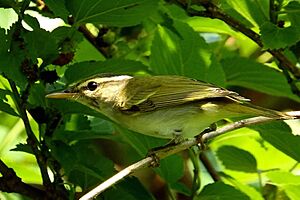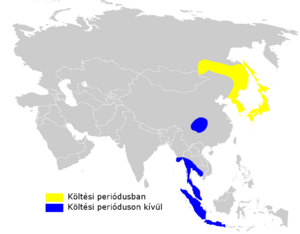Eastern crowned warbler facts for kids
Quick facts for kids Eastern crowned warbler |
|
|---|---|
 |
|
| Taipei | |
| Conservation status | |
| Scientific classification |
|
| Kingdom: | Animalia |
| Phylum: | Chordata |
| Class: | Aves |
| Order: | Passeriformes |
| Family: | Phylloscopidae |
| Genus: | Phylloscopus |
| Species: |
P. coronatus
|
| Binomial name | |
| Phylloscopus coronatus (Temminck & Schlegel, 1845)
|
|
 |
|
| The range of eastern crowned warbler Breeding Non-breeding | |
| Script error: The function "autoWithCaption" does not exist. | |
| Synonyms | |
|
Ficedula coronata Temminck & Schlegel, 1847 |
|
Script error: No such module "Check for conflicting parameters".
The eastern crowned warbler (Phylloscopus coronatus) is a small, colorful bird. It belongs to the Old World warbler family, called Phylloscopidae. These birds live in cool, green forests across eastern Palearctic regions.
Contents
Discover the Eastern Crowned Warbler
What Does the Eastern Crowned Warbler Look Like?
The eastern crowned warbler is a medium-sized bird. It has bright colors and a strong build. Its back is a dark olive-green. Its belly is white.
This warbler has a special head pattern. It has dark grey stripes on the sides of its head. There is also a faint yellowish stripe in the middle. A long, yellowish-white stripe runs above its eye. A dark line goes through its eye. Its cheeks are a dusky yellow color. It also has a single light bar on its wing. Its tail is square with a small fork. The bird has a strong, pale beak and dark legs.
Where Do Eastern Crowned Warblers Live?
Eastern crowned warblers breed in eastern Siberia. Their breeding grounds stretch from the Argun River eastwards. They also live south into western Manchuria, central Sichuan, the Korean Peninsula, and Japan.
When winter comes, these birds fly south. They spend winter in Southeast Asia. This area includes eastern India, Bangladesh, and Java. Sometimes, a few birds fly off course. They have been seen in western Europe. The first one in Great Britain was spotted in County Durham in 2009.
What is the Eastern Crowned Warbler's Home and Habits?
Eastern crowned warblers prefer open woodlands. These can be forests with mixed trees or only deciduous trees. They live at lower and middle mountain heights. In the northern parts of their range, they live in dense taiga forests.
During winter, they live in open woodlands, thick jungles, and mangrove swamps. These birds mostly stay in trees. However, they will search for food closer to the ground. They often join groups of other small birds. This happens both in winter and during breeding season. You can often find these birds by listening for their frequent singing. They are good at catching insects in the air. They fly out from a branch to grab flying bugs.
What Does the Name Mean?
The scientific name for this bird is Phylloscopus coronatus. The first part, Phylloscopus, comes from Ancient Greek words. Phullon means "leaf." Skopos means "seeker" or "watcher." So, it means "leaf-seeker." The second part, coronatus, is from Latin. It means "crowned." This name likely refers to the crown-like pattern on the bird's head.
 | Jewel Prestage |
 | Ella Baker |
 | Fannie Lou Hamer |


